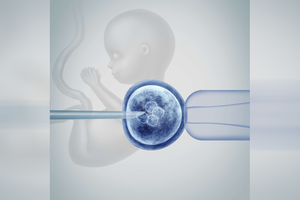New AI tool could be the answer to male infertility

The problems linked to male infertility include low sperm count, low sperm motility, low testosterone and abnormal sperm.
What you need to know:
- According to a 2020 study conducted by Kenyatta National Hospital (KNH), low sperm count is a leading cause of male infertility.
- In 2018, a staggering 14.12 per cent of men at the KNH fertility clinic had no sperm in their semen, doubling from 7.6 per cent in 2013.
Infertility is on the rise in the country. Data from the Kenya Fertility Society show that at least one in every five couples suffers from infertility. The data also estimate that at least 4.2 million Kenyans require medical assistance to conceive.
According to a 2020 study conducted by Kenyatta National Hospital (KNH), low sperm count is a leading cause of male infertility. In 2018, a staggering 14.12 per cent of men at the KNH fertility clinic had no sperm in their semen, doubling from 7.6 per cent in 2013. However, the emergence of a groundbreaking Artificial Intelligence (AI) tool named SpermSearch, created by Dr Steven Vasilescu and his team at the University of Technology Sydney in Australia, brings new hope to men who want a biological child of their own, but have no sperm in their semen or have low sperm count.
The researchers say the AI tool could help men with fertility issues father children. This technology can spot a healthy sperm cell in samples taken from severely infertile men 1,000 times faster than a highly trained expert's eye.
“It can highlight a potentially viable sperm before a human can even process what they are looking at,” Dr Vasilescu noted.
So, why is the quick sperm-spotting so important? Well, for some men, like those with a condition called non-obstructive azoospermia (NOA), they don't produce any sperm at all upon ejaculation. In such cases, doctors often have to surgically remove a small piece of testes tissue and manually search for healthy sperm in the lab.
This process can be slow, taking up to six or seven hours, and it's prone to human errors due to fatigue. Imagine looking through a microscope at a jumbled mix of cells, blood and tissue, trying to find just a few sperm cells—like finding a needle in a haystack? “When an embryologist looks down the microscope, what they see is just this complete mess - a starscape of cells.
“There is blood and tissue. There might be only 10 sperm cells in the whole thing, but there can be millions of other cells. It is a needle in a haystack,” Dr Vasilescu said. That is where SpermSearch comes in handy. It can identify healthy sperms within seconds when photos of the samples are uploaded into a computer.
Dr Swabra Briek, a gynaecologist and fertility specialist at Premier Hospital in Mombasa, supports this ground-breaking invention. She believes it is a significant step forward as it promises to alleviate the prolonged waiting times for test results.
“This invention is truly commendable. It has the potential to alleviate the burden of prolonged result waiting times, which can be especially challenging for individuals seeking fertility treatments. It is crucial to note that male infertility can stem from various factors. Therefore, once the results are obtained, one can promptly initiate the necessary treatment procedures,” Dr Swaleh said.
The researchers noted that the AI tool is not designed to replace embryologists, but to assist them, thereby improving the chances of success by reducing fatigue and inaccuracy. While the system is still in the early stages of development, it has the potential to revolutionise the treatment of infertility by reducing the time and cost of treatment.





